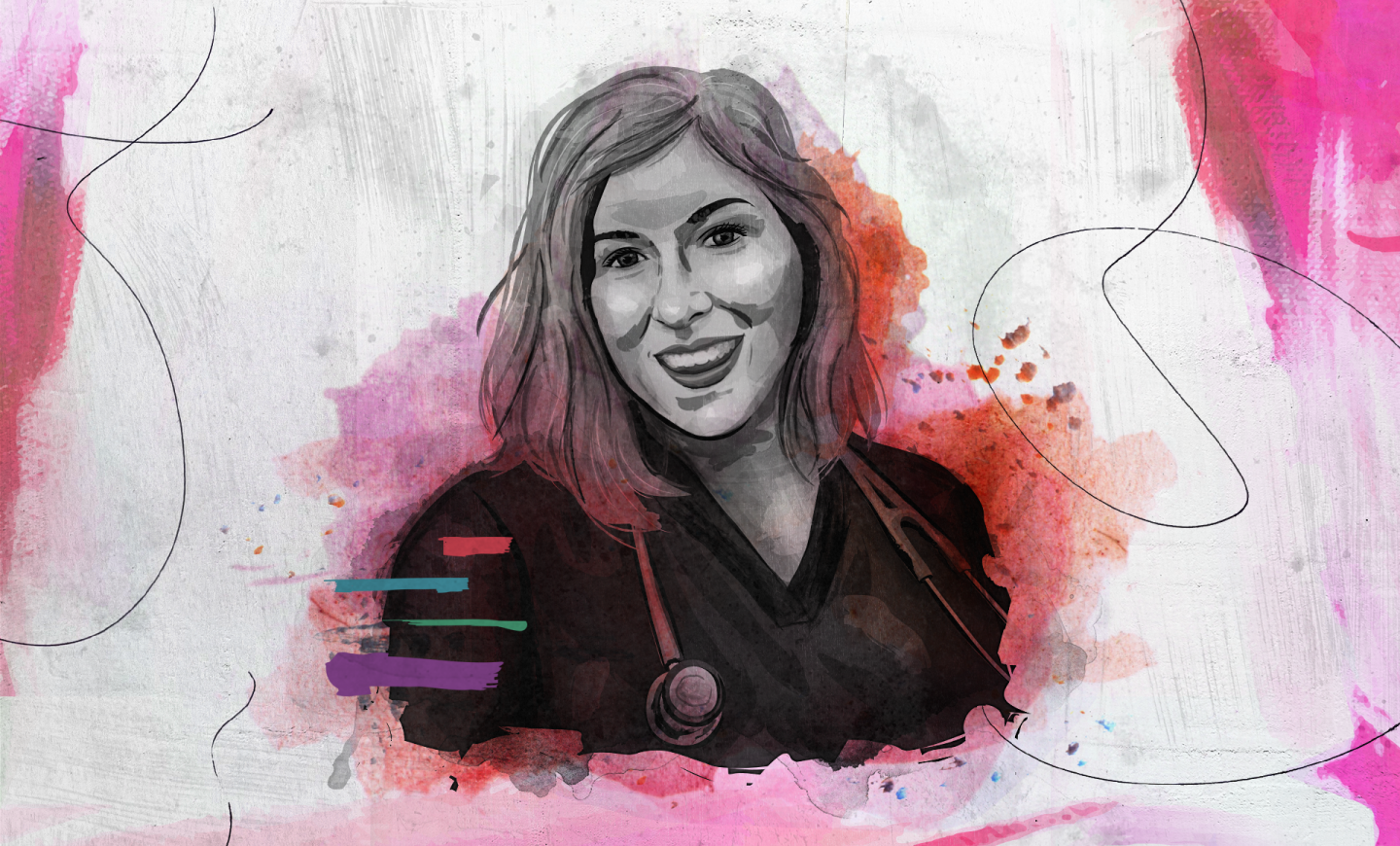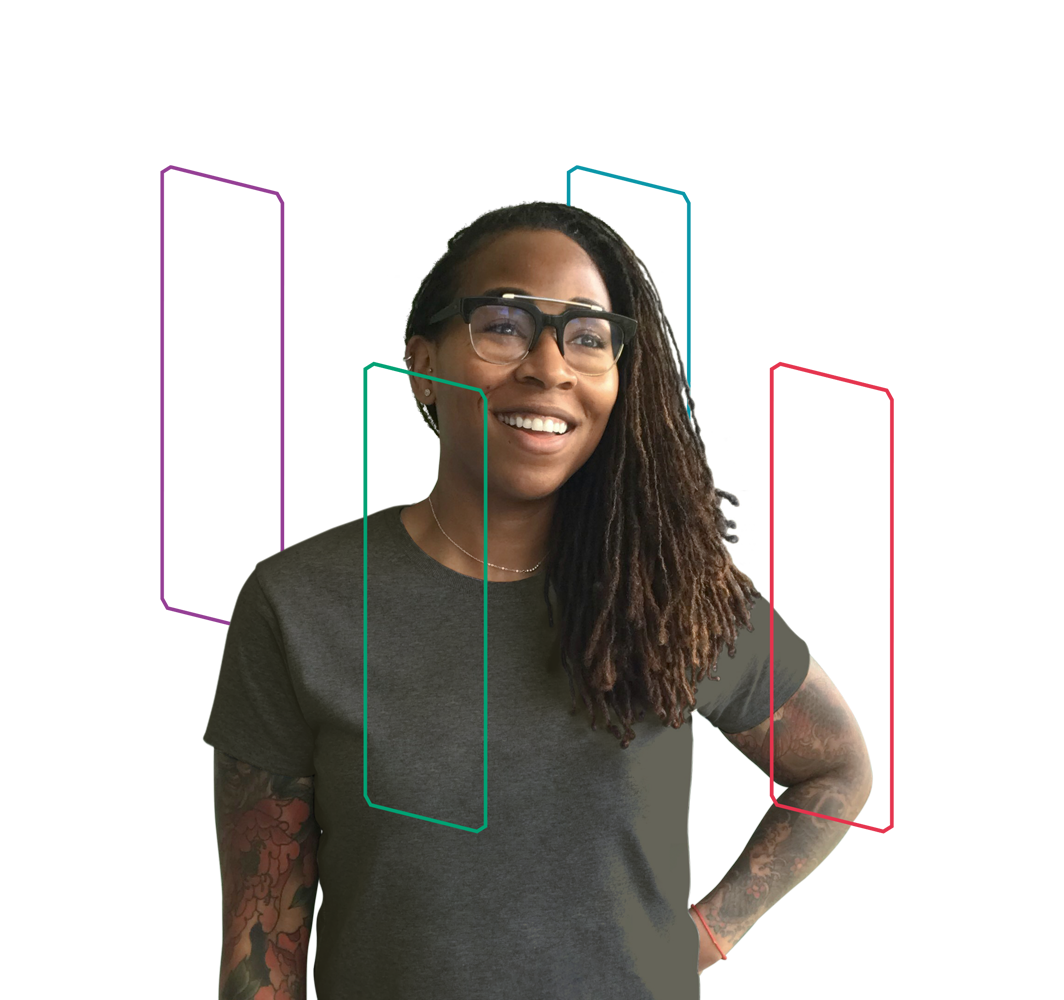Our Spotlight series highlights a new nurse from the SHIFT audience each month. We ask the same set of questions each time, but, of course, we get all kinds of answers. The individual stories and surprise twists in these conversations make us laugh, cry and feel proud. Over time, we hope to discover both what makes each of you unique and understand what ties all of us together as nurses.
Despite an unprecedented year, Amber G. graduated nursing school in December 2020 and is now working as a NICU nurse in Maryland. She shares what makes working in the NICU so special (and sparkly!) and touches on why the nursing community needs to challenge itself to set aside bias when it comes to treating the LGBTQ+ community. Her passion for advocating for health equity for LGBTQ+ patients — specifically LGBTQ+ youth — solidifies our faith in the future of nursing.
Why did you decide to go into nursing?
I am a career jumper, so I originally received a bachelor’s degree in communications — I had this huge dream of being the next Anderson Cooper. But I didn’t love the corporate environment or having a desk job, and I felt like there was something missing, so I did some soul searching. I found that I needed to be able to do something where I saw an impact — I wanted to be able to see how I was changing someone’s life or changing the community. I eventually stumbled into nursing. I started taking certified nursing assistant (CNA) classes on the weekends through the American Red Cross to make sure that nursing and healthcare was actually for me. When I became certified, I then started taking home health CNA clients on nights and weekends.
From there, I started the prerequisites for nursing, and it was really, really tough. I would drive two hours into Washington, D.C., work a full day, and then I would drive back to go to class at night. I would study all night and all weekends. As I went further into the prerequisites, and then eventually into nursing school, I found a job that was a little bit easier to manage during nursing school. It was tiring, but looking back, I never found myself thinking that this might be a bad decision. It was always about moving forward because it felt like the right path. I love everything about it.
Tell us about a time when it was really hard to be a nurse or a time that made you question being a nurse.
I think that there’s a lot of things about nursing that give you hope for humanity and give you so much pride in being a nurse. There are also moments that make it really hard to be a nurse. In the NICU, we have a lot of great days, where we see a lot of healthy babies, but we also see babies that are very, very sick. It can be hard to manage your own feelings about the situation. And it can be hard to see the light in some of those dark situations, but at the end of the day, I always remind myself that I can make a difference for someone else. That I have a place there at the table, where I’m supposed to be, and that I can make an impact.
Who inspires you?
My biggest inspiration is Dolly Parton. She’s my own patron saint! I love that she sparkles and doesn’t care what other people think about her. She’s just so full of joy. She works to bring so much happiness and joy to other people, and that’s something I would love for myself, to one day leave behind a legacy of doing so much good. One of the biggest things I always tell every baby when they get discharged from the NICU is that “I hope you live the most joyful life that you possibly can.” And that’s truly my motto. I just think that you should live joyfully, and I think that’s what Dolly Parton does every single day. I just love her!
Describe your SHIFT BFF. Why are they your best friend on the job?
My shift BFF, Elisa, is actually my main preceptor for my nurse residency program, so she is stuck with me right now! She is such a real person, and she always corrects me with grace, which I think is such an underestimated skill. She always speaks with such kind words when she speaks with our parents, especially the ones who maybe are a little more difficult to deal with.
She is always kind when speaking with parents to educate them through all the processes. She is such an embodiment of what a good nurse is, and I really respect her for that. Beyond that, she’s always hyping me up, and I think you always need a hype man in your life. Everybody needs an Elisa in their life to hype them up.
Tell us something about your specialty in nursing that other nurses may not know.
I think the number one thing that people don’t know about the NICU is that we regularly give caffeine as a medication. And boy, do I respect that because I really feel like caffeine is my own medication! We do give caffeine as a medication to our babies to make sure that they don’t have any apneic events where they stop breathing. I don’t think that there are many other specialties that see the magic like NICU sees. There are babies who come in who are only about a pound, and they leave such chunky babies. It’s such a transformation that we see in front of our eyes — it’s truly the power of science at work!
Describe your community’s health. What is your hope for your community’s health in the future?
I think that our community is beyond just our local community. It’s also the people who are not seen as often, such as the LGBTQ+ youth, and many other underrepresented groups. I was an LGBTQ+ youth many moons ago at this point, and I did not really feel like I had anyone that I could turn to. I was going to a very religious school at the time and had very religious parents. I would have really loved to have had a nurse or a healthcare professional that was on my side. Instead, during the first few years of me being in the LGBTQ+ community, when I would go to the doctor and bring up sexual orientation, I always got some form of judgmental comment made back at me. I really think that that’s such a hindrance to kids.
If we’re discouraging an entire community from going to the doctor regularly because they’re afraid they’ll get comments directed at them, then that doesn’t help anyone.
Some of our patients talk about taking PrEP, which is a medication that can prevent the spread of HIV. During one of my classes, the instructor said, “We should never tell them about this because it can encourage them to have bad behaviors.” And I think that’s such a sad thing for a health care professional to say because people are going to go out and do things that maybe you or I don’t agree with. But it’s their life and they deserve to be protected, not to hear someone’s opinion. We need to look at our own biases and figure out what makes us feel uncomfortable and kind of challenge them a little bit. So in my practice now as a nurse, I really am fiercely protective of any LGBTQ+ families.
There are some nurses that we have that don’t have the education that many of us younger people do. So I’m always very happy to sit down with them and say, “This is what we call people nowadays, these are what pronouns are.” Just sit and talk to them about these issues because I think we should make these environments as welcoming as we can.
I really think that sometimes we just need to put in that kind of work, and I think educators at hospitals can really help with that. It doesn’t have to be us as individual nurses.
What is your vision for the future of nursing?
I would love nursing to be a more inclusive community, and I would love us to not only be inclusive of ourselves but more inclusive in how we take care of patients. I do think that there is a huge health disparity regarding race and sexual orientation, and I think we need to work on solving those for the future. Working in labor and delivery, you do see that there are huge gaps and how especially minority mothers are treated in comparison to white mothers. And that’s a very sad thing to see. I would love to see the nursing community to rise and speak up against racism and biases in health care. To work to create this more inclusive future, where everyone feels safe going to see their doctor and safe giving birth in a hospital.
I have been pleasantly surprised at how kind all the nurses in my unit have been to me, but I know that’s not always the case. As nurses, we need to be able to correct people with grace and welcome other nurses — because these are our peers, and you should treat them as such. You don’t have to be friends with everyone on your unit, but we should at least make an effort to treat each other in a civilized manner and help each other out. Nursing is a team sport! We really need each other’s teamwork to make the dream work.
Describe one of your best shifts ever.
I think my best shift ever honestly was my first shift working as an actual nurse after graduating. Everything just felt so new and sparkly. I got to sign my name and have RN behind it, and that feeling was so magical — I honestly hope it never goes away! It was actually such a chaotic first day. It was not smooth at all. I was helping to do procedures that I had never done before, but my charge nurse was there, and she was so graceful in guiding me on things that I could do to help. And everyone worked together as a team. I just kind of sat back during this very chaotic moment and thought, “Wow, this is a team that really works well together and I’m so excited to be here.” It gave me such good vibes and was such a good shift, even if it wasn’t exactly a perfect shift.
If you’re interested in sharing your story for the SHIFT Talker Spotlight, please reach out here or email us at hello@shiftnursing.com.


